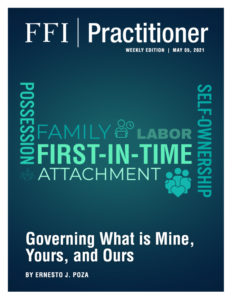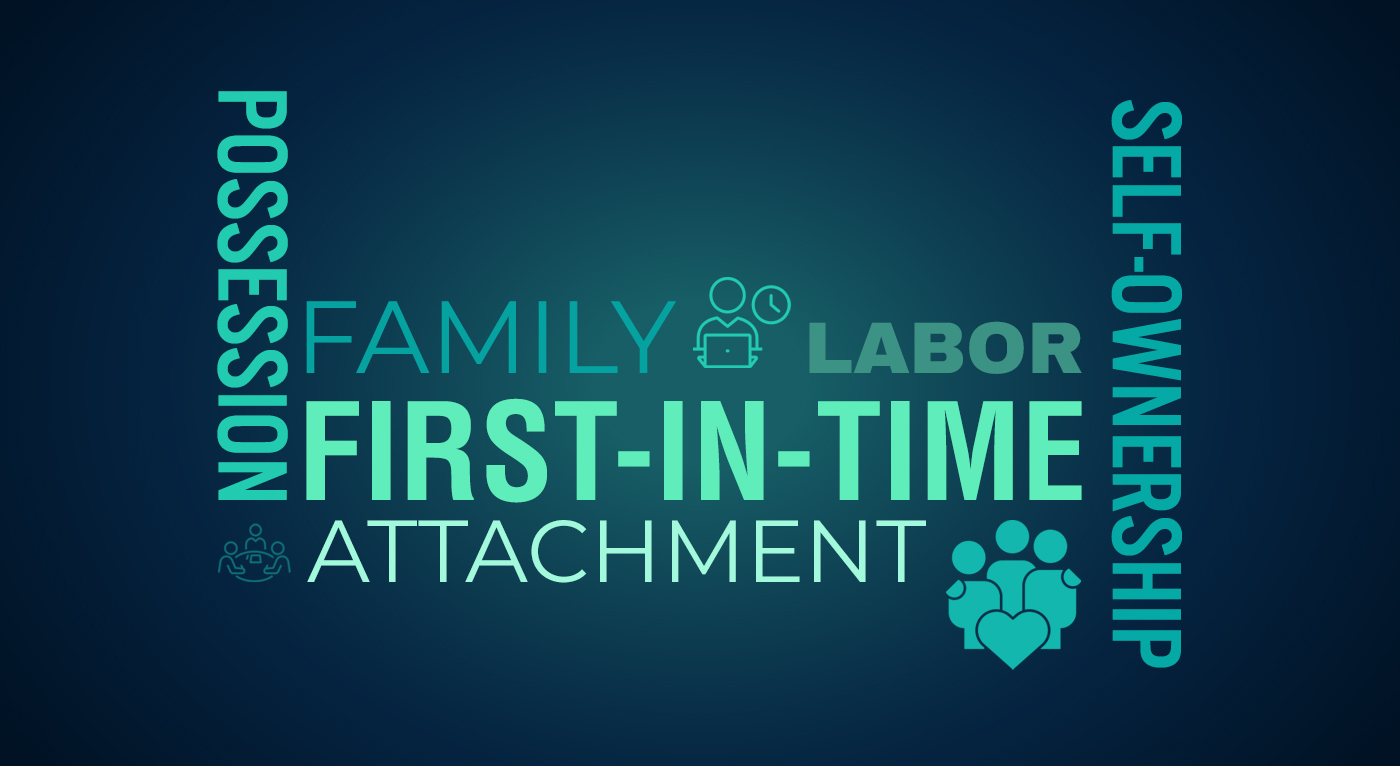
View this edition in our enhanced digital edition format with supporting visual insight and information.
Thanks to this week’s contributor, FFI Fellow and founding member of FFI, Ernesto Poza, for this thought piece on the many facets of ownership in family enterprises and how effective governance can help to clarify these complex dynamics.
Claiming ownership is always a contest, generally without a predetermined outcome by legal statutes, and defined by six principles: first-in-time, possession, labor, attachment, self-ownership, and family.1
Family ownership is the overarching principle of ownership in a family business. While tax law and estate law recognize this unique form of ownership within a business family or a family of wealth, the five other ownership principles may have been used at various times to assist in the allocation of ownership and powers to individual family members or to branches of the family.
“First-in-time,” for example, would argue for the first-born to be the de-facto successor. The new CEO could also be vested with 100% ownership or majority ownership, via trust language and/or a management role in the business, a large measure of control in the operation of the business, or the management of the wealth. Primogeniture was certainly a predominant way to determine next-generation control and leadership of family businesses and family wealth for hundreds, if not thousands of years, and still influences succession in wine companies in Europe and industrial giants in Asia.
Possession, it used to be claimed, is nine-tenths of the law. We are hard-wired for physical possession claims, as any parent or grandparent of a toddler can attest to in the frequent assertions of “mine” by a two-year-old. And in family business, I have experienced this principle being claimed to legitimize continued use of a particular office, company plane, parking spot, or an extended stay at a family vacation property. I am reminded of a next-generation member whose extensive use of the family ranch was held up to claim not only near-exclusive use of the property, but also sole decision-making authority in improvements and renovations—to which all family members were expected to contribute.
Labor, particularly appealing in a meritocratic society, is often claimed within a business family to argue for greater ownership rights or privileges upon succession, as a result of years of service, management rank (e.g., service as CEO) or superior strategic insight in connection to a growth initiative, a new product, or an acquisition that enhanced the family’s wealth and/or reputation. Contrary to advisors’ recommendations, a next-generation CEO I know was awarded 51% of the voting stock upon the death of the company founder. While most of the argument for this outcome was quite valid – the CEO’s past performance, and perhaps even beneficial to the common good of the owning family, control could just as easily have been a sibling partnership responsibility, particularly given the prospects of future wealth-creation by a younger sibling.
Attachment claims, as in oil rights in Texas or water rights in California as attachments to the owned land, at least in my experience, are not frequent in the family business arena, though they are common in the partitioning of family estates.
And finally, self-ownership rights are perhaps most relevant in the psychodynamics of a family, as a polarity to the presumed power emanating from parenthood in the family and/or greater ownership control in the business. I have witnessed, for example, next-generation members chafing at the exercise of power in the business by a parent or grandparent. I have also heard many a female member of the family advocating for greater influence or equity in decision-making. And next-generation members’ complaints about their curtailed sense of freedom and independence, due to concerns over the extended family’s reputation in the age of social media, have been the subject of family council conversations all over the world. Just think of the unimaginably complex field of tension surrounding the recent claims for independence by Harry (Henry) Mountbatten-Windsor and Megan Markle on the British royal family.
But when it comes to family ownership, or collective ownership of anything, these principles and the family ownership concept itself are lacking, as is the law. Perhaps our greatest assistance to family business clients when it comes to ownership—perhaps the most fundamental property of family business and family wealth—is to think about it not in terms of a legally-established “on/off” switch, but rather as co-developed set of principles, rules, and governing bodies that are openly discussed. Of course, family constitutions, shareholder and buy-sell agreements, boards of directors, ownership and family councils, family assemblies, and even family offices assist in the complex and nuanced administration of such governance architecture.2
Governance may be the only enduring alternative to the ownership gridlock that often accompanies generational transitions in growing and larger families of enterprise.
This collaborative perspective of ownership also suggests partnering with the best and brightest legal minds in our field to assist families that have come to understand that ownership transitions have become increasingly complex. While there is no longer an easy “on/off” switch for ownership, it is both reasonable and best-of-practice to aim for business performance and family unity, clarity and inclusivity, independence and continuity, control and flexibility, and financial and socio-emotional wealth creation for generations to come.
References
1 Heller, M. & Salzman, J., Mine! How the hidden rules of ownership control our lives. Doubleday, 2021.
2 All these approaches are extensively discussed in the book, Family Business, 5th edition, by Poza, E. & Daugherty M., Cengage, 2018.
About the Contributor

Ernesto J. Poza, FFI Fellow, is an internationally recognized speaker and consultant to family-controlled and family-owned businesses. He is Professor Emeritus of Global Entrepreneurship and Family Enterprise at Thunderbird’s School of Global Management. A founding member of FFI and recipient of both the Richard Beckhard Practice Award and the FFI International Award, Ernesto has advised owners and top managements of more than a hundred family-owned and family-controlled companies over the past 40 years. He can be reached at Poza@family-business.com.

View this edition in our enhanced digital edition format with supporting visual insight and information.





